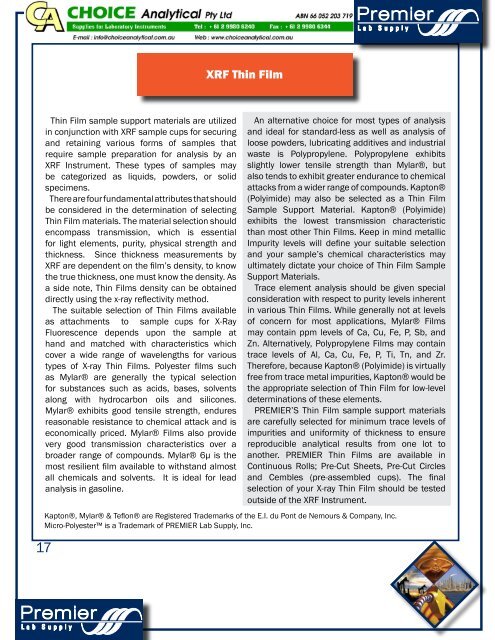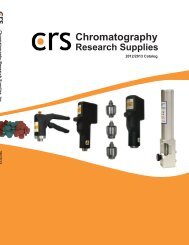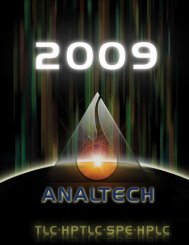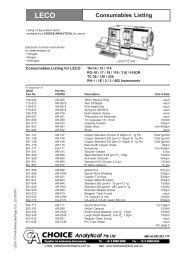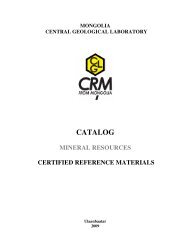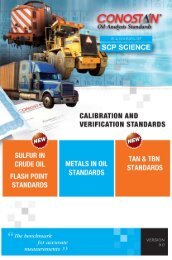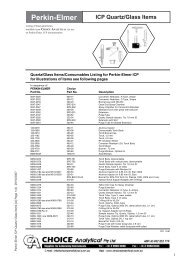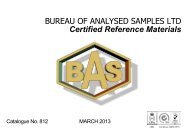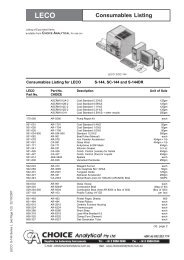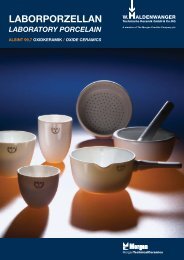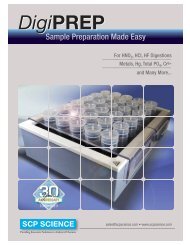XRF Sample Preparation Specialists
XRF Sample Preparation Specialists
XRF Sample Preparation Specialists
You also want an ePaper? Increase the reach of your titles
YUMPU automatically turns print PDFs into web optimized ePapers that Google loves.
<strong>XRF</strong> Thin FilmThin Film sample support materials are utilizedin conjunction with <strong>XRF</strong> sample cups for securingand retaining various forms of samples thatrequire sample preparation for analysis by an<strong>XRF</strong> Instrument. These types of samples maybe categorized as liquids, powders, or solidspecimens.There are four fundamental attributes that shouldbe considered in the determination of selectingThin Film materials. The material selection shouldencompass transmission, which is essentialfor light elements, purity, physical strength andthickness. Since thickness measurements by<strong>XRF</strong> are dependent on the film’s density, to knowthe true thickness, one must know the density. Asa side note, Thin Films density can be obtaineddirectly using the x-ray reflectivity method.The suitable selection of Thin Films availableas attachments to sample cups for X-RayFluorescence depends upon the sample athand and matched with characteristics whichcover a wide range of wavelengths for varioustypes of X-ray Thin Films. Polyester films suchas Mylar® are generally the typical selectionfor substances such as acids, bases, solventsalong with hydrocarbon oils and silicones.Mylar® exhibits good tensile strength, enduresreasonable resistance to chemical attack and iseconomically priced. Mylar® Films also providevery good transmission characteristics over abroader range of compounds. Mylar® 6µ is themost resilient film available to withstand almostall chemicals and solvents. It is ideal for leadanalysis in gasoline.17An alternative choice for most types of analysisand ideal for standard-less as well as analysis ofloose powders, lubricating additives and industrialwaste is Polypropylene. Polypropylene exhibitsslightly lower tensile strength than Mylar®, butalso tends to exhibit greater endurance to chemicalattacks from a wider range of compounds. Kapton®(Polyimide) may also be selected as a Thin Film<strong>Sample</strong> Support Material. Kapton® (Polyimide)exhibits the lowest transmission characteristicthan most other Thin Films. Keep in mind metallicImpurity levels will define your suitable selectionand your sample’s chemical characteristics mayultimately dictate your choice of Thin Film <strong>Sample</strong>Support Materials.Trace element analysis should be given specialconsideration with respect to purity levels inherentin various Thin Films. While generally not at levelsof concern for most applications, Mylar® Filmsmay contain ppm levels of Ca, Cu, Fe, P, Sb, andZn. Alternatively, Polypropylene Films may containtrace levels of Al, Ca, Cu, Fe, P, Ti, Tn, and Zr.Therefore, because Kapton® (Polyimide) is virtuallyfree from trace metal impurities, Kapton® would bethe appropriate selection of Thin Film for low-leveldeterminations of these elements.PREMIER’S Thin Film sample support materialsare carefully selected for minimum trace levels ofimpurities and uniformity of thickness to ensurereproducible analytical results from one lot toanother. PREMIER Thin Films are available inContinuous Rolls; Pre-Cut Sheets, Pre-Cut Circlesand Cembles (pre-assembled cups). The finalselection of your X-ray Thin Film should be testedoutside of the <strong>XRF</strong> Instrument.Kapton®, Mylar® & Teflon® are Registered Trademarks of the E.I. du Pont de Nemours & Company, Inc.Micro-Polyester is a Trademark of PREMIER Lab Supply, Inc.


